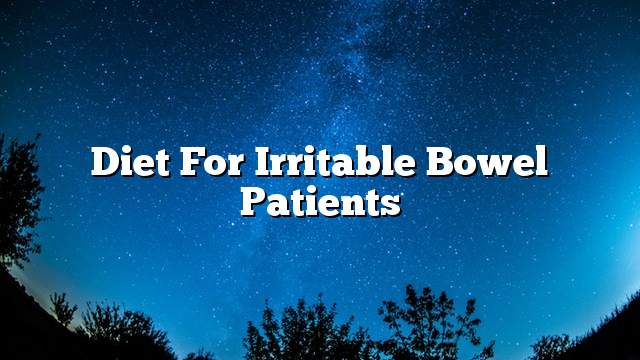Nervous colon diet
Irritable bowel syndrome is a disease of the age due to stress and anxiety, where it suffers from a large segment of people. This is due to mental disorders which are characterized by rapid emotion, excessive anger and concealment, in addition to the nature of food intake, which contributes to the doubling of this disease and increase, Should be recovered and eliminated, because the person suffering from irritable bowel has a great sensitivity to some foods, which lead to bloating and indigestion, and therefore the patient should consult a nutritionist to develop a diet suitable for him, and works to alleviate the symptoms and pain of And in this article we will learn about the recommended diet for people with irritable bowel syndrome.
Internists and dietitians recommend patients with irritable bowel syndrome to follow a specific diet, with an explanation of what is most important.
- Avoid eating Irritable Irritable Irritants By recording all the foods the patient is eating, and identifying the food that causes the irritation of the colon, before starting the diet, so that the patient under the supervision of the doctor to replace those foods with other foods containing all the nutrients such as vitamins and minerals, The colon protects against irritation.
- Fiber-rich foods: Dietary inclusion of fiber-containing foods helps to relieve irritable bowel syndrome and reduce constipation. Fiber helps improve intestinal function, stimulates it to function properly, and keeps the colon swollen and expanding. Prevents convulsions that cause pain, cramping, and sometimes diarrhea.
- Take into account the introduction of fiber-rich foods in Petro by starting two or three fibers per day and gradually increasing the amount to up to 25 grams per day to reduce the intake of fiber.
- Stay away from eating foods that contain fat, because fat increases the cramps that affect the bowel after eating shortly, and contribute to the cause of contractions and diarrhea.
- Avoid fried foods, which contain a proportion of spices and spices, in addition to caffeine and alcohol; because they increase spasms.
- Eat small meals to relieve colon symptoms. Large meals increase cramps and diarrhea, so you can eat three small meals a day on a regular basis, along with two snacks, which helps to reduce the symptoms of the colon.
- Eat slowly and without speeding, and try to chew it drastically.
- Drink plenty of fluids, so you should eat at least eight cups of water a day, especially for people with severe diarrhea.
- Avoid chewing gum, because it is one of the most common causes of bloating, because of its contribution to the entry of a large amount of air into the intestines.
